* * * * *
ART THOU THE MAID?
Art thou the maid from whose blue eye
Mine drank such deep delight?
Was thine that voice of melody
Which charm’d the silent night?
I fain would think thou art not she
Who hung upon mine arm,
When love was yet a mystery,
A sweet, resistless charm.
It seemed to me as though the spell
On both alike were cast;
I prayed but in thy sight to dwell,
For thee, to breathe my last.
Mine inmost secret soul was thine,
Thou wert enthroned therein,
Like sculptured saint in holy shrine,
All free from guile and sin.
And, heaven forgive! I did adore
With more than pilgrim’s
zeal;
And then thy smile——But
oh! no more!
No more may I reveal.
Enough—we’re parted——Both
must own
The accursed power of gold.
I wander through the world alone;
Thou hast been bought
and sold.
Blackwood’s Magazine.
* * * * *
It would be a very pleasant thing, if literary productions could be submitted to something like chemical analysis,—if we could separate the merit of a book, as we can the magnesia of Epsom salts, by a simple practical application of the doctrine of affinities.
* * * * *
THE GATHERER
A snapper up of unconsidered trifles.
SHAKSPEARE.
* * * * *
A GOOD FELLOW.
The secretary of a literary society being requested to draw up “a definition of a good fellow,” applied to the members of the club, individually, for such hints as they could furnish, when, he received the following:—
Mr. Golightly.—A good fellow is one who rides blood horses, drives four-in-hand, speaks when he’s spoken to, sings when he’s asked, always turns his back on a dun, and never on a friend.
Mr. Le Blanc.—A good fellow is one who studies deep, reads trigonometry, and burns love songs; has a most cordial aversion for dancing and D’Egville, and would rather encounter a cannon than a fancy ball.
Hon. G. Montgomery.—A good fellow is one who abhors moralists and mathematics, and adores the classics and Caroline Mowbray.
Sir T. Wentworth.—A good fellow is one who attends the Fox-dinners, who goes to the Indies to purchase independence, and would rather encounter a buffalo than a boroughmonger.
Mr. M. Sterling.—A good fellow is a good neighbour, a good citizen, a good relation; in short, a good man.
Mr. M. Farlane.—A good fellow is a bonnie braw John Hielandman.
Mr. O’Connor.—A good fellow is one who talks loud and swears louder; cares little about learning, and less about his neckcloth; loves whiskey, patronizes bargemen, and wears nails in his shoes.




